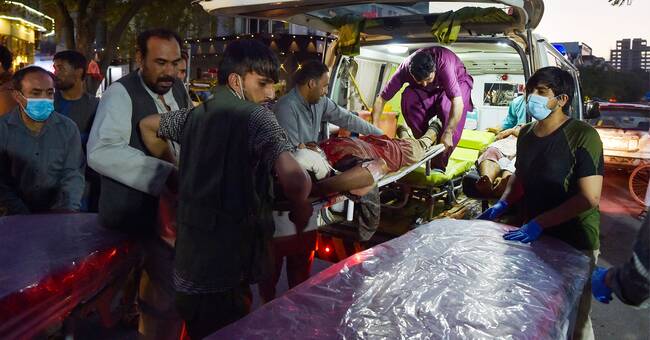When US President Joe Biden tried to defend the chaotic sortie from Afghanistan the other day, he said something that is conspicuous after today's alleged assassination attempt in Kabul.
Biden described a growing threat from the terrorist group IS in Afghanistan (ISIS-K).
- Every day we remain in place is another day where we know that ISIS-K is trying to attack the airport.
Whether it is really IS that is behind the explosions at the airport is at the time of writing only speculation.
But that Biden could say so already on Tuesday suggests more than just general knowledge of the threat situation.
For the Biden administrations, the incident is of course another failure on the way out of Afghanistan.
It is a failure they also share with their new partners - the Taliban they released to power.
Expected Taliban rule
The US war in Afghanistan is first and foremost a war on terrorism.
Not a war for democracy or for women's rights, but a safeguarding of one's own security interests.
Of course, this does not mean opposing the other, but that has not been the real motive, according to, for example, the former US ambassador to Kabul.
It was the 9/11 attacks that triggered the invasion, not testimonies of life under brutal Taliban rule.
Today, almost two decades later, the fundamental priority has not changed.
Under both Trump and Biden, the White House has had good access to forecasts of a rapid Taliban takeover after the US withdrawal.
Of course, they have not forgotten what kind of government the Taliban is striving for, but they have released them anyway.
Terrorism prio ett
The United States let the Taliban take over Afghanistan in exchange for security guarantees and some obligatory wording on dialogue with other political forces.
If you read the agreement between the United States and the Taliban, you see how little is about Afghanistan's political future when the terror talk is filtered out.
The US negotiating position was undermined by its outwardly obvious desire to withdraw as soon as possible.
The Taliban hardly felt pressured into any major concessions when the other side seemed prepared to pack up and pull in basically free.
The fact that Western countries prioritize anti-terrorism is also evident from their statements since the Taliban took over.
Of course, the calls for respect for women, human rights and the sharing of political power to be good and important are there.
But the most definite are the demands not to roll out the red carpet for various terrorists.
Pious hopes
Therefore, today's attack on Kabul airport is a major political problem for both the Taliban and the West, in addition to the bloody act itself.
The Taliban have been at odds with, for example, IS, whose supporters enviously condemned the Taliban's success.
Bloody conflict with rival jihadists is difficult in itself.
It also rhymes badly with the promises of stability and counter-terrorism with which the Taliban bought power.
The United States, for its part, has taken the same Taliban promises as revenue to withdraw.
In fact, part of the responsibility for one's national security has been transferred to the same Taliban that housed al-Qaeda.
It is a subcontractor with, to put it mildly, dubious references that it has now committed itself to.
What the United States and its allies must now hope for is that their enemy is common.
Unfortunately, hope, as the cliché goes, is not a strategy.
Javascript is disabled
Javascript must be turned on to play video
Read more about browser support
The browser is not supported
SVT does not support playback in your browser.
We therefore recommend that you switch to another browser.
Read more about browser support
At least 11 people were killed in the attack outside the airport, including children, a Taliban spokesman said, writes Reuters.

